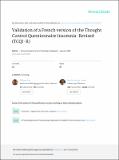Validation of a French version of the thought control questionnaire-insomnia revised (TCQI-R) / Validation d’une version française du questionnaire révisé de contrôle mental-insomnie

Type de référence
Date
2009Langue de la référence
AnglaisEntité(s) de recherche
Swiss Centre for Affective Sciences, University of Geneva, Geneva, Switzerland
Résumé
Counterproductive strategies of mental control are assumed to contribute to excessive cognitive activity, thereby exacerbating sleep disturbances.The present study examined the psychometric properties of a French version of the thought control questionnaire-insomnia revised (TCQI-R;Ree, M.J., Harvey, A.G., Blake, R., Tang, N.K.Y., Shawe-Taylor, M., 2005. Attempts to control unwanted thoughts in the night: developmentof the thought control questionnaire-insomnia revised (TCQI-R). Behaviour Research and Therapy 43, 985–998.), a new instrument designed tocapture different strategies of thought management that people use when trying to fall asleep. Analysis of the responses of 298 adults replicatedthe six-factor solution involving aggressive suppression, behavioral distraction, cognitive distraction, reappraisal, social avoidance, and worry.The corresponding subscales showed sound internal consistency. Further, all thought control strategies correlated significantly with some facets ofinsomnia, with aggressive suppression and worry being most strongly related to sleep disturbances. These findings suggest that the French TCQI-Rconstitutes a valuable instrument for investigating the implications of mental control in insomnia. L’utilisation de stratégies de contrôle mental contre-productives peut entraîner une activité cognitive excessive et, par cette voie, exacerberdes problèmes de sommeil. La présente étude a examiné les propriétés psychométriques d’une version franc¸aise du questionnaire révisé decontrôle mental-insomnie (Ree, M.J., Harvey, A.G., Blake, R., Tang, N.K.Y., Shawe-Taylor, M., 2005. Attempts to control unwanted thoughtsin the night: development of the thought control questionnaire-insomnia revised (TCQI-R). Behaviour Research and Therapy 43, 985–998.), unnouvel instrument destiné à capter différentes stratégies de gestion de pensée couramment utilisées à l’endormissement. L’analyse des réponsesde 298 adultes a répliqué la solution à six facteurs impliquant la suppression agressive, la distraction comportementale, la distraction cognitive, laréévaluation, l’évitement social et l’inquiétude. Les sous-échelles correspondantes ont montré une consistance interne satisfaisante. De plus, toutesles stratégies de contrôle mental, particulièrement la suppression agressive et la tendance à s’inquiéter, ont corrélé de manière significative aveccertains aspects de l’insomnie. Ces données suggèrent que la version franc¸aise du TCQI-R constitue un outil précieux pour étudier l’implicationdu contrôle mental dans l’insomnie.Titre du périodique
Revue européenne de psychologie appliquée / European Review of Applied PsychologyMaison d’édition
Elsevierp-ISSN
1162-9088e-ISSN
1878-3457Evaluation par les pairs (peer reviewing)
ouiPortée nationale / internationale
internationaleVolume / tome
59Fascicule
1Pagination
69-78URL permanente ORFEE
http://hdl.handle.net/20.500.12162/4131Autre(s) URL(s) permanente(s)
http://doi.org/10.1016/j.erap.2007.08.002Document(s) associé(s) à la référence
Texte intégral :
Fichier
Accès
Commentaire
Version
Taille
- Tout ORFEE
- Détail référence



